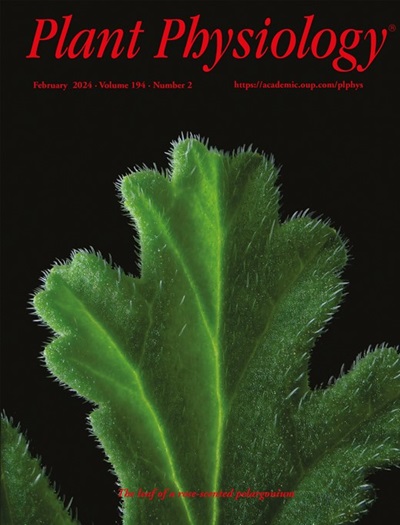OsPUB75-OsHDA716 mediates deactivation and degradation of OsbZIP46 to negatively regulate drought tolerance in rice
IF 6.5
1区 生物学
Q1 PLANT SCIENCES
引用次数: 0
Abstract
Histone deacetylases (HDACs) play crucial roles in plant stress responses via modification of histone as well as non-histone proteins; however, how HDAC-mediated deacetylation of non-histone substrates affects protein functions remains elusive. Here, we report that the Reduced Potassium Dependency3/Histone Deacetylase1 (RPD3/HDA1)-type histone deacetylase OsHDA716 and plant U-box (PUB) E3 ubiquitin ligase OsPUB75 form a complex to regulate rice drought response via deactivation and degradation of basic leucine zipper (bZIP) transcription factor OsbZIP46 in rice (Oryza sativa). OsHDA716 decreases ABA-induced drought tolerance, and mechanistic investigations showed that OsHDA716 interacts with and deacetylates OsbZIP46, a key regulator in ABA signaling and drought response, thus inhibiting its transcriptional activity. Furthermore, OsHDA716 recruits OsPUB75 to facilitate ubiquitination and degradation of deacetylated OsbZIP46. Therefore, the OsPUB75-OsHDA716 complex exerts double restrictions on the transcriptional activity and protein stability of OsbZIP46, leading to repression of downstream drought-responsive gene expression and consequently resulting in reduced drought tolerance. Conversely, OsbZIP46 acts as an upstream repressor to repress OsHDA716 expression, and therefore OsHDA716 and OsbZIP46 form an antagonistic pair to reciprocally inhibit each other. Genetic evidence showed that OsHDA716 works with OsbZIP46 in a common pathway to antagonistically regulate rice drought response, revealing that plants can fine-tune stress responses by the complex interplay between chromatin regulators and transcription factors. Our findings unveil an acetylation-dependent regulatory mechanism governing protein functions and shed light on the precise coordination of activity and stability of key transcription factors through a combination of different post-translational modifications.OsPUB75-OsHDA716 介导 OsbZIP46 的失活和降解,负向调节水稻的耐旱性
组蛋白去乙酰化酶(HDAC)通过修饰组蛋白和非组蛋白,在植物胁迫响应中发挥着关键作用;然而,HDAC 介导的非组蛋白底物去乙酰化如何影响蛋白质功能仍是一个未知数。在这里,我们报告了还原钾依赖性3/组蛋白去乙酰化酶1(RPD3/HDA1)型组蛋白去乙酰化酶OsHDA716和植物U-box(PUB)E3泛素连接酶OsPUB75形成复合物,通过去活化和降解水稻(Oryza sativa)中的碱性亮氨酸拉链(bZIP)转录因子OsbZIP46来调控水稻的干旱响应。机理研究表明,OsHDA716 与 ABA 信号转导和干旱响应中的关键调控因子 OsbZIP46 相互作用并使其去乙酰化,从而抑制其转录活性。此外,OsHDA716还能招募OsPUB75,促进去乙酰化的OsbZIP46的泛素化和降解。因此,OsPUB75-OsHDA716 复合物对 OsbZIP46 的转录活性和蛋白稳定性施加了双重限制,导致下游干旱响应基因表达受抑,从而降低了耐旱性。相反,OsbZIP46作为上游抑制因子抑制OsHDA716的表达,因此OsHDA716和OsbZIP46形成一对拮抗因子,相互抑制。遗传学证据表明,OsHDA716与OsbZIP46在一个共同的途径上拮抗调控水稻的干旱响应,揭示了植物可以通过染色质调控因子和转录因子之间复杂的相互作用来微调胁迫响应。我们的研究结果揭示了一种依赖乙酰化的调控机制,该机制可调控蛋白质的功能,并揭示了关键转录因子通过不同的翻译后修饰组合精确协调其活性和稳定性。
本文章由计算机程序翻译,如有差异,请以英文原文为准。
求助全文
约1分钟内获得全文
求助全文
来源期刊

Plant Physiology
生物-植物科学
CiteScore
12.20
自引率
5.40%
发文量
535
审稿时长
2.3 months
期刊介绍:
Plant Physiology® is a distinguished and highly respected journal with a rich history dating back to its establishment in 1926. It stands as a leading international publication in the field of plant biology, covering a comprehensive range of topics from the molecular and structural aspects of plant life to systems biology and ecophysiology. Recognized as the most highly cited journal in plant sciences, Plant Physiology® is a testament to its commitment to excellence and the dissemination of groundbreaking research.
As the official publication of the American Society of Plant Biologists, Plant Physiology® upholds rigorous peer-review standards, ensuring that the scientific community receives the highest quality research. The journal releases 12 issues annually, providing a steady stream of new findings and insights to its readership.
 求助内容:
求助内容: 应助结果提醒方式:
应助结果提醒方式:


